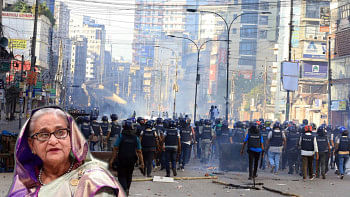Power sector’s indemnity act repealed at last

The government yesterday repealed the long-debated "indemnity act" of the power sector, bringing to an end the 15-year-long practice of awarding contracts under opaque circumstances.
The ministry of law, justice and parliamentary affairs issued an ordinance titled "Ordinance to Repeal the Quick Enhancement of Electricity and Energy Supply (Special Provisions) 2010 Act" on behalf of the president.
The ordinance was issued as there is no parliament and the matter warrants immediate action.
On November 14, the High Court declared two sections of the act unconstitutional as those protected the decisions of the government from legal challenges and gave the energy minister the sole authority to approve all sorts of plans for the sector.
Section 9 of the act states that no question about any action done or deemed to be done, and any order or direction given under this law, cannot be raised before any court.
Section 6 (2) says that any planning or proposal related to the buying or investment decisions has to be approved by the energy minister and sent to the cabinet committee for approval after communicating and bargaining with one or more institutions.
In the ruling, which came following a writ petition filed by Supreme Court lawyers Shahdeen Malik and Md Tayeb-Ul-Islam Showrov on August 28 citing public interest, the HC condoned the actions already taken in good faith under the two sections of the act to avoid legal complexities.
The president's ordinance said the contracts signed under the 2010 act or the actions taken under the contracts would be counted as legal before the act was repealed.
However, the government will preserve the rights to review all the activities done under the act and to take actions in this regard in public interest, the ordinance added.
Using the act, which was passed by parliament in 2010 initially for five years but amended several times to extend its validity to 2026, the previous Awami League government awarded power and energy projects without floating tenders.
In so doing, Bangladesh's power generation capacity soared to 27,000 megawatts (MW) even though the demand is around 17,000 MW. And due to a fuel supply shortage, the government failed to produce more than 15,600MW of electricity.
Subsequently, the state had to give capacity charges amounting to Tk 130,000 crore to the idle power plants over the last 15 years, according to the data from the Bangladesh Power Development Board. Of the sum, about Tk 32,000 crore was given in fiscal 2023-24 alone, a major leap from Tk 5,600 crore handed out in fiscal 2017-18.
In addition, major decisions in the energy sector like making deals to import high-priced liquified natural gas from international spot markets and awarding multibillion-dollar gas infrastructure to selected companies were also taken using the 2010 act.
The interim government has announced after taking oath that they will not use the act to make decisions for the power sector.

 For all latest news, follow The Daily Star's Google News channel.
For all latest news, follow The Daily Star's Google News channel. 



Comments